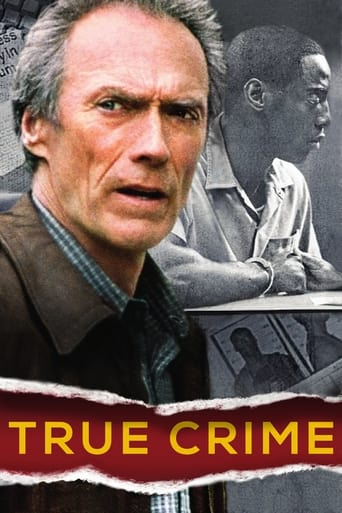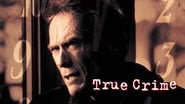MartinHafer
"True Crime" is an exciting film to watch...and I am glad I saw it. And, the film brings up some really important reasons why the death penalty, at least in some cases, is a crazy punishment because you cannot undo it once it's done.Clint Eastwood (who is actually too old for this role) plays Steve, a reporter for an Oakland newspaper. He's a mess...a womanizer, a drunk and a jerk. But when he's given a last moment assignment to interview a man about to be executed, something odd happens to Steve...he begins to give a darn about something. And, the more he digs the more the case looks shaky...built upon only eyewitness testimony and circumstantial evidence.This is an uneven film. The portions with Eastwood were okay but not much more. Where the movie really, really shined was in portraying the man on death row and his family...that was marvelously made and Eastwood, in this case, was a better director than actor and got some marvelous performances out of everyone. Worth seeing but uneven and, when you think about it, hard to believe. Plus, that homeless guy...why was he in the film and who thought having him sexually harass ladies was funny or worth including in the story?!
FilmBuff1994
True Crime is a very mediocre film with a reasonably developed storyline and a terrific cast. The performances are certainly the highlight, the characterization for the majority of cast members is superb, with some very inspired acting from Clint Eastwood playing a character very different from his usual roles, the best scenes were the ones between him and Isaiah Washington, they are intense, emotional and the only parts that gave me any bit of a thrill. It shouldn't have been advertised as a thriller or a mystery, it shouldn't have been given the name True Crime, because with those genres and that title attached to it, you're going to expect to be put at the edge of your seat, some high level intensity with many exciting moments, and none of that is evident here, it mostly consists of the characters, normally just two, in a room together, talking, whether or not the performances are good, there comes a time when this simply becomes boring. There isn't as much conflict as there should be in this film either, Eastwood's character always has hope that he will crack this case, there's never really a moment where he loses it, a scene where he hits rock bottom and it dosen't seem like there's any way he can come out of it, this should be evident in every movie, but Eastwood seems to get his way far too often that it is unrewarding once the conflict is resolved in the end. Terrific performances sadly aren't enough to save a boring movie, and I wouldn't recommend True Crime to anyone. A journalist comes across new evidence that helps a man on death row. Best Performance: Clint Eastwood Worst Performance: Denis Leary
Desertman84
True Crime is a mystery dramatic film starred and directed by Clint Eastwood.It was based on Andrew Klavan's 1997 novel of the same title. Clint Eastwood also stars in the film as a journalist covering the execution of a death row inmate, only to discover that the convict may actually be innocent, together with Isaiah Washington,Denis Leary,Lisa Gay Hamilton and James Woods.In the story,Steve Everett is an Oakland journalist recovering from alcoholism, given the task of covering the execution of convicted murderer Frank Beechum. Everett discovers that Beechum might be innocent, but has only a few hours to prove his theory and save Beechum's life. Eventually Steve learns that a young man named Warren, who was stabbed to death three years previously, killed the victim but is unable to prove it. After seeing a necklace belonging to the victim on TV, Steve remembers Warren's grandmother wearing it when he visited her, and he returns to her house, where she has come to the same realization about the murder and rushes off with Steve to alert the governor as the execution starts. They reach the governor and tell him what they know and he calls the prison and pardons Frank just in time to save his life.True Crime is another film that could be classified as a Dirty Harry film wherein the movie presents a flawed anti-hero who comes through in the end.Although the viewer would suspect what would become of the movie from the beginning especially with Eastwood starring and directing the movie,it was still handled professionally and magnificently.Although it was definitely not one of his best works due to its formulaic plot and somewhat predictable events that are to come,it was still an above average film.Although the mystery does not succeed,the study of character of the protagonist makes up for it.
johnnyboyz
The unexpected catalyst, that eventually comes to propel the lead, through Clint Eastwood's 1999 detective thriller True Crime and into a realm of investigation; intuition and towards the truth arrives when a young female journalist on a very specific job is tragically killed in a road traffic accident. It is deemed, by most therein, that the woman was a great girl; a wonderful person and really good at her job – a woman who was "really on top of things" at the time of her death, and yet it appears was careless enough to be doing something around sixty, late at night and on a rain-sodden road having had the odd drink and on a stretch of track notorious for a certain deadly bend. Such stark differences between assumed sentiments and gruff realities having taken a good look at the situation are at the core of True Crime; a film driven by the force of Eastwood both on the screen and off it, in what is a film all about murky underestimations combating with hard-up truths. Fittingly, it is a film about a man placed into the same situation as the aforementioned deceased young journalist; a situation that has already run its course in terms of trials, allegations and musings although doesn't necessarily come out infallible to meaner, stone-wall truths which our lead eventually comes to suspect are omnipresent.Eastwood's character is Steve Everett, a California based journalist with years of experience but a debilitating marriage and a wavy track record of cracking open big stories though making bogus claims when all appeared right to him. The character is one of those old and wily, without necessarily being particularly nice, archetypes of movies of old whom just have that natural gift of being able to work their way through grisly problems and to both spot and comprehend things no one else seemingly can. He enjoys a drink and the company of a younger woman, whilst symptomatically struggles with his wife and infant daughter. His credentials are somewhat impressive, in that he managed to expose political sleaze, in spite of his own lifestyle, more broadly linked to that of the town's mayor, although the attempting to prove a rapist's innocence prior to their controversial confession was an instance in which his ability failed him.He works for that of a hotshot journalist chief named Alan Mann, played in that spitfire fashion by James Woods; a character of whom we are introduced to by way of a long tracking shot down and through the corridors of his building, as he spouts everything he needs to say - the scene concluding in his office which is rife with qualifications and journal covers of past newsworthy events. The case Everett ends up inheriting is that of the reporting on the execution of an African American individual who was given the death penalty for a store robbery and murder. He is Frank Beechum; a man, like Everett, with a wife and infant daughter and is played with effective understated regret by Isaiah Washington. Beechum is due to be killed via lethal injection in a few hours time, immediately rendering what eventually formulates as the crux of the film as a dramatic race against time – the manner in which he will be killed is somewhat agonisingly outlined to us with a measured precision by the warden and his staff, in that we are granted access to the chamber; steal a glance at all the switches and buttons and realise the magnitude of the situation. Additionally, the sheer chasm between the staff there and the likes of Everett, in regards to law enforcers or those of whom merely seek justice, is made prominent when one staff members shrugs upon being asked for an opinion and allows Beechum's court verdict to stand for his stance.The core of the film is Everett's attempt at uncovering something a little more concrete on why it is one would suspect Beechum of innocence; Eastwood doing really well to keep the film moving along, even if we don't necessarily buy into him as the sort of character Everett is - a younger, more aggressive presence in the mould of what Woods pulls off perhaps required. The film carries somewhat of a Bad Lieutenant vibe to it, as this tale of a man with some considerable power and questionable priorities charges through a world attempting to get to the bottom of proceedings plays out. Despite this, the film arrives with much more of a grounded; more accessible procession to it, and veers away from a more hardened edge of anti-heroism and such to the point that it perhaps required to be more dramatic and more biting.The film's element of its lead and his race against the clock is clumsily surmised every so often with inert insertions into proceedings of compositions of clocks or clock faces in some form; a persistent reminder that time is indeed running out, and an element overall which, try as it might, does not necessarily feel as prominent as it might have. In spite of what's at stake, there appears very little on the urgency scale and it lacks a wounding, cut-and-thrust dynamic which may have worked really well. Principally, Everett fights for a truth which will allow a victimised man to return to his wife and young daughter, as he himself disparagingly neglects that of what he has in that exact form. Running on this theme of redemption or righting wrongs, it is an opportunity for him to correct what happened in regards to that case of the misjudged rapist from years gone by; the film functional without necessarily being overly involved, a film which isn't necessarily dull but is safe, uninspiring fare which happens to conclude with the sort of sequence Robert Altman was actually sending up mere years previously in his Hollywood satire The Player. Whoops.







